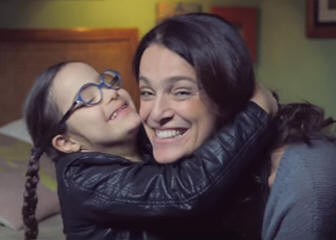Catholic Medical Quarterly Volume 67(1) February 2017
Editorial
Defending the Right of Free Speech for People with Down’s Syndrome
Dr Adrian Treloar
In March 2016, for World Down’s Syndrome Day, a group of 15 people with Down’s syndrome published a beautiful video. [1] In it they seek to tell women who are worried about giving birth to child with Down’s Syndrome that things may be much better than a woman may first fear. The video is truly beautiful, with smiling and happy young people, showing true love to their mothers. And the video should be a very good resource for women who are thinking through a decision to abort their child. It would also be a source of information which doctors and midwives might be able to offer women as they think through what to do.

Dear Future Mom, March 21
World Down Syndrome Day
www.youtube.com/watch?v=Ju-q4OnBtNU
So beautiful is the (award-winning) video, that it was thought to be appropriate for screening on French State Television. Which is when an extraordinary injustice occurred. The Conseil Supérieur de l'Audiovisuel (CSA) is the French authority which regulates what can and cannot be showed on television. They decided that the video was “inappropriate” because the young people’s expression of happiness in the video was "likely to disturb the conscience of women who had lawfully made different personal life choices". And on 10/11/2016 France’s Conseil d'Etat rejected an appeal by people with Down’s syndrome, their families, allies and associations to lift the discriminatory ban.
There is an urgent need to develop resources such as “Dear Future Mom.” This was shown by an extraordinary documentary, aired on BBC 2 in October 2016. The actress Sally Phillips presented “A world without Down’s.” [2] In small part the documentary was her own personal story about her daughter who has Down’s syndrome. But it was also much more. The documentary shows how the number of children born with Down’s has been going down as a result of antenatal screening and abortion. But it also shows how the advice and support given to women who find themselves pregnant with a Down’s child can be so one-sided and slanted towards abortion.
That medical bias towards abortion is a topic upon which we have previously commented [3]. And as Sally Phillip’s’ documentary told us, the tragic reality is that in Iceland screening and subsequent advice is so effective that no child with Down’s has been allowed to be born for the last 5 years. In the UK 90% of all children conceived with Down’s syndrome are killed before birth.
Many were deeply shocked and moved by the documentary. The documentary set out well that the advice and support that women get is one-sided. Jane Fisher is director of Antenatal Results and Choices which is the only organisation the NHS recommends for counselling for women ante-natally diagnosed with a Down’s child. In the documentary Jane Fisher stated that their non-directive counsellors they will not tell women women that they will be able to cope with a Down’s child and that her counsellors were not up to date with what living with Down’s syndrome means. And when asked about how she would counsel a woman who has been given an antenatal diagnosis of learning disability, she suggested that she would ask if the woman knew about the option of termination without making any reference to thinking through what the needs and abilities of the child might be etc. When, as a mother of child with Down’s, Sally Phillips pointed out her worry that “the information being given out is not reflective of how it is to be a person with Down’s syndrome” she was simply told that counselling is non-directive. Which means that counsellors cannot be seen to share good-news stories about living with Down’s. Fears and worries may be explored but good news and hope may be withheld.
The censorship of “Dear Future Mom” is an extraordinary denial of the right of the disabled to free speech. People with Down’s syndrome have been denied their right to free speech to protect the sensibilities of the able.
As a result, people with Down’s syndrome are being eliminated from society. The gifts and joys of living with Down’s are silenced.
And the withholding and censorship information about Down’s makes victims of mothers who, at a moment of deep crisis and lacking support, decide to abort their child. Such withholding of information is at clear variance with the recent ruling (Montgomery vs Lanarskhire [4]) for doctors that they must tell patients all the facts they need to know before a procedure is planned.
In response to that, “Dear future Mom” is a courageous attempt by individuals with Down’s syndrome to redress that balance. The video is a right and proper piece of health education. The censorship of “Dear Future Mom” is an extraordinary denial of the right of the disabled to free speech. People with Down’s syndrome have been denied their right to free speech to protect the sensibilities of the able. That is gravely wrong.
People with Down’s syndrome can live a happy
life
As health professionals we accept our duties to promote health and better knowledge to the wider community. At the time of writing nearly 8 million people have viewed “Dear Future Mom.”
Please defend freedom of speech by watching it. And encourage others to do so to.
References
- Dear Future Mom: March 21 - World Down Syndrome Day. #DearFutureMom www.youtube.com/watch?v=Ju-q4OnBtNU
- The video is no longer on the BBC website. But searching for “A World without Downs” https://www.youtube.com/watch?v=F-SSIwVZeWs may enable it to be seen.
- Treloar A (2014) A light shining in the darkness: the gift of people with Down’s syndrome and the medical mis-selling of Down’s syndrome. Catholic Medical Quarterly Volume 64(4) November 2014
- Montgomery (Appellant) v Lanarkshire Health Board (Respondent) (Scotland) before the Supreme court. March 2015 https://www.supremecourt.uk/decidedcases/docs/UKSC_2013_0136 _Judgment.pdf
Dr Adrian Treloar MRCPych, FRCP, MRCGP
is a Consultant in Old Age
Psychiatry
